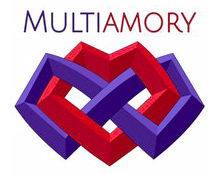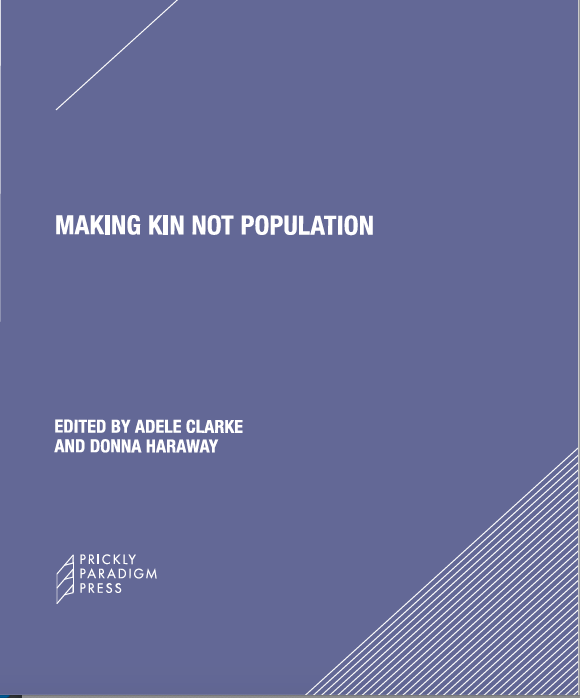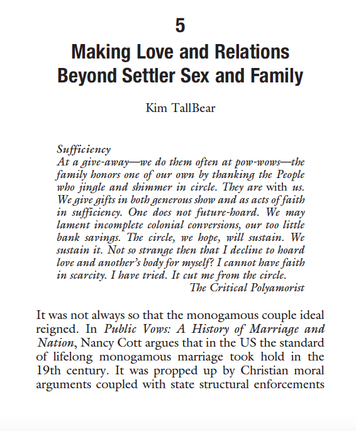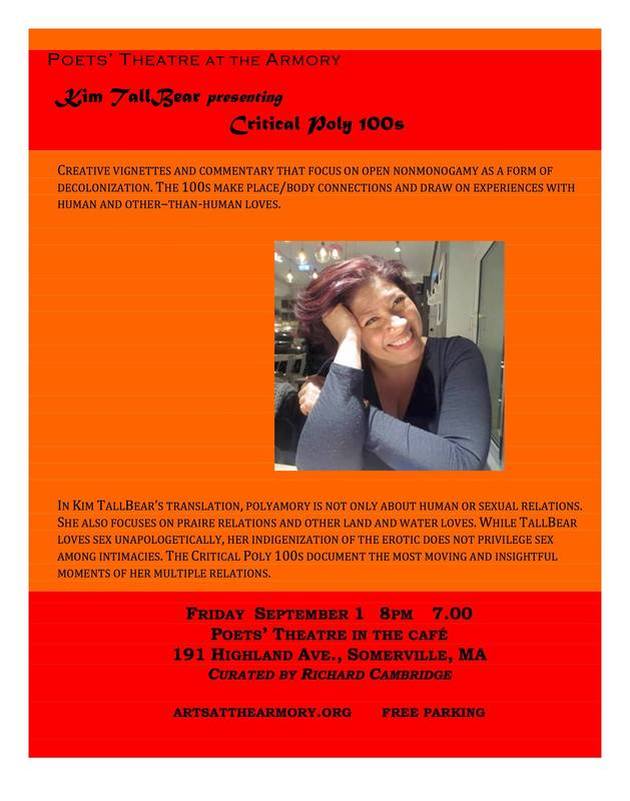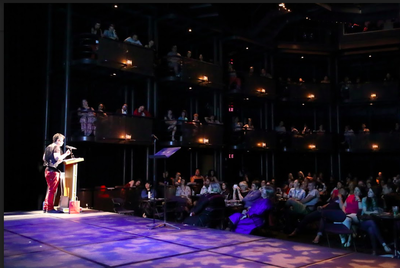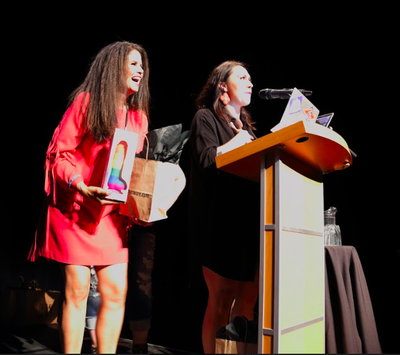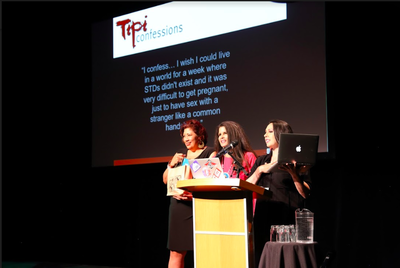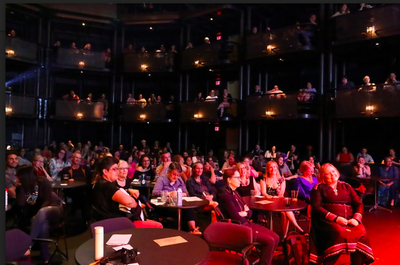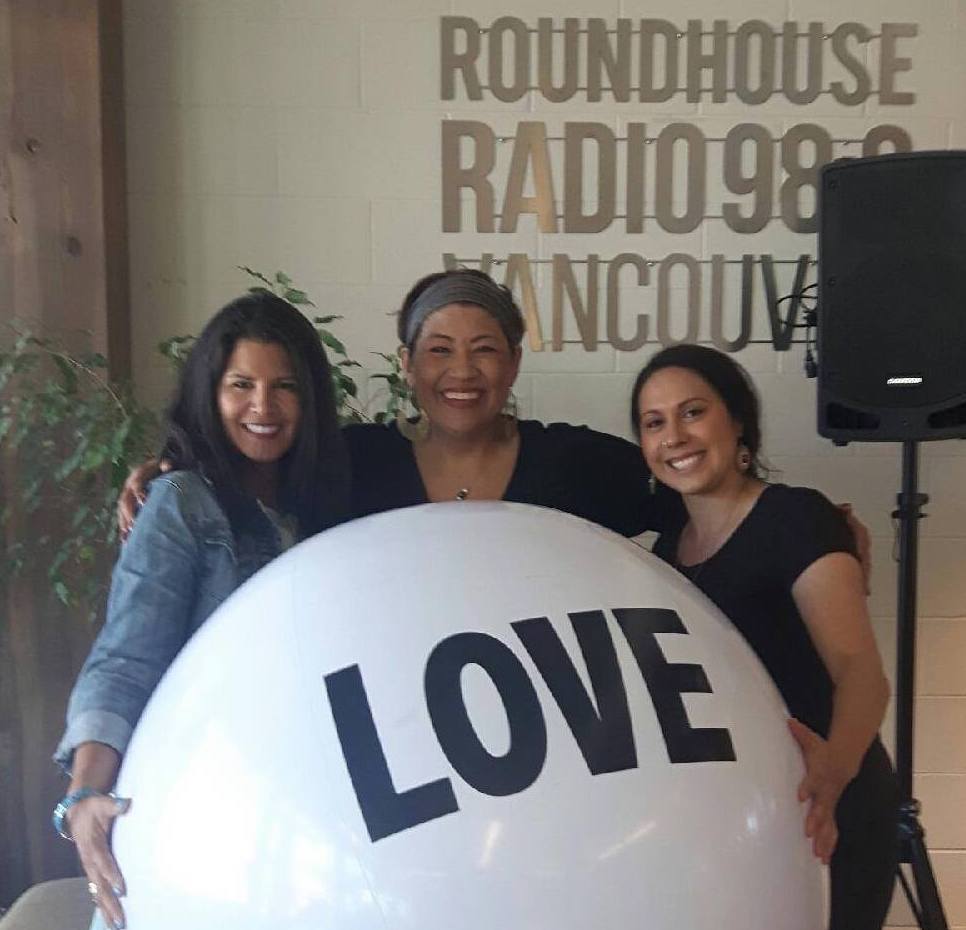Critical polyamorist blog
|
Dear readers, I have done multiple podcast interviews in the last year or two on critical polyamory. I decided I should gather them together. Below are summaries and links for those that i can recall, most recent first. Readers are welcome to remind me of any links I might forget and I will add them to this post. Thank you all for reading. And happy listening!
Released 3.19.2019
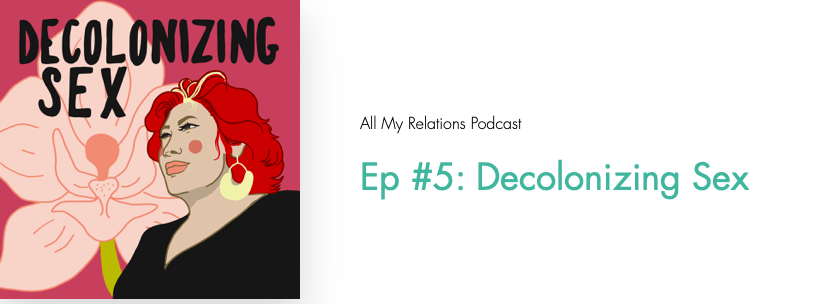
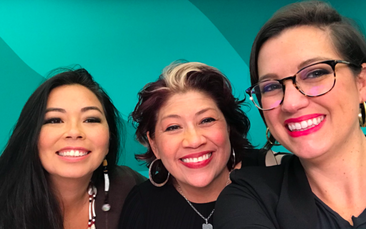 Matika, Kim, Adrienne Matika, Kim, Adrienne
Please listen to this episode at:
https://www.allmyrelationspodcast.com/podcast/episode/468a0a6b/ep-5-decolonizing-sex. This is my most recent podcast interview, and one of the funn(i)est conversations I have had on this topic. This is the "Decolonizing Sex" Episode 5 of Adrienne Keene and Matika Wilbur's new podcast, "All My Relations." I loved laughing and talking with Adrienne and Matika, and thank them for having me on their beautifully produced podcast to talk about critical polyamory and relations of multiplicity. We also talked about social media and blogging as a feminist method of inquiry and, as Adrienne calls it, "consenting to learn in public." So there is a discussion too of feminist methods in this convo! We recorded this episode at the Tacoma Art Museum, Tacoma, Washington, USA.
Released 10.29.2018
Please listen to this episode at: https://soundcloud.com/patty-wbk/kim-tallbear
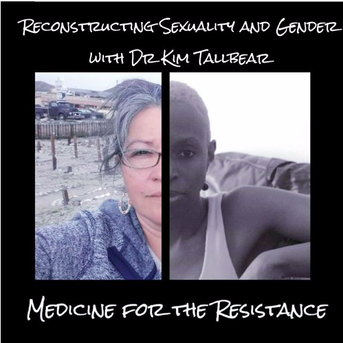
This episode of Medicine for the Resistance, "Reconstructing sexuality with Dr. Kim Tallbear" (Gender and Sexuality series), was recorded by phone (or Skype?). The embed code on the Soundcloud site doesn't seem to be working, but you can click on the episode title above and go right to this podcast. Here is the episode description from the Medicine for the Resistance Soundcloud site. Dr. Kim Tallbear joins M4R and challenges us to consider what it means to live out the words of Aileen Morton Robinson: "Be less possessive, and do something every single day to undermine the colonizer." Join us for a conversation about thinking beyond identity to what it means to live in good relation with all our relatives. The language of identity is necessary to address inequity but shifting the lens to consider what it means to live in good relationship allows us to move beyond these silos into living together. If we want to talk about decolonizing our lives, we need to think about being in good relation instead of seeking inclusion in the settler state.
Released 9.04.2018
This conversation touches on critical polyamory in a wide-ranging conversation about Indigenous citizenship and relationships with the Breakdances with Wolves team, Gyasi Ross, Wesley ("Snipes Type") Roach, and Minty LongEarth," a few Natives with opinions and a platform." i really enjoyed hanging out with them and their technical team on-air. Breakdances with Wolves is based in Seattle, Washington, USA.
Released 7.27.2018
This episode, "Identity, Sexuality, and Tipi Confessions," touches on identity--particularly related to the intersection of tribal citizenship, blood rules, and newer technologies of DNA testing as well as sexuality and intimate relationships. We recorded during the same week that I was in Seattle at the University of Washington as a decolonial ethics faculty member with the Summer internship for INdigenous peoples in Genomics (SING), the other main scholarly work that I do.
Released 7.24.2018
This episode 181 "Settler Sexuality with Dr. Kim TallBear." This conversation with the Multiamory Podcast produced by Emily Matlack, Dedeker Winston, and Jase Lindgren covers the basics of "settler sexuality" as i think about that in relationship to what I call "critical polyamory." We talked about how to create relationships and kinship networks beyond the confines of the definitions of appropriate sexuality and family forms imposed on Indigenous peoples and others by settler-colonialism.
Released 5.05.2018
This is episode 113 of my regular podcast, Media Indigena, "A Second Slide into Settler Sexuality." Here is the full show description from Media Indigena site: Saddle up for our Settler sexuality sequel! Building on last week’s exploration of how Settler norms impact Indigenous notions of intimacy and interpersonal connections, we more explicitly discuss the erotically infused insights of Mohawk/Tuscarora writer, poet and broadcaster Janet Rogers. Insights she shared with our own Kim TallBear (associate professor of Native Studies at the University of Alberta) at ConvergeCon, the annual conference working to build sex positive communities. Joining host Rick Harp to reflect on Kim and Janet's dialogue is Candis Callison, associate professor at UBC's Graduate School of Journalism.
Released 4.27.2018
This is episode 112 of my regular podcast, Media Indigena, "Settler Sexuality's Slipper Slope." Here is the full show description from Media Indigena site: On this week's roundtable: Settler Sexuality. A subject at the heart of two recent talks by our own Kim Tallbear (one at the sex-positive communities event ConvergeCon, the other at SoloPolyCon), we thought we'd use it as an opportunity to take a longer look at an often troubling and taboo topic. In particular, we discuss the insights of her keynote — "Yes, Your Pleasure! Yes, Self-love! And Don’t Forget, Settler Sex Is A Structure" — at the 2nd Annual Solo Polyamory Conference in Seattle, Washington. An associate professor of Native Studies at the University of Alberta, Kim discussed her work at the MEDIA INDIGENA roundtable with host Rick Harp and Candis Callison, associate professor at UBC's Graduate School of Journalism.
Released 11.2017
Released November 2017, this episode of Feral Visions podcast, “Dr. Kim TallBear: Moving Beyond Settler (Colonial) Sexualities. is hosted by Anjaii Nathy Updhyay with Liberation Spring.
Here is the full show description from Feral Visions: How did our ancestors practice relationships and sexuality prior to colonization? Learn from Dr. Kim TallBear about moving beyond settler colonial sexualities! What's a decolonial approach to the settler institution of monogamy? These are some of the topics we delve into.
Released 9.01.2017
"Just Pleasure" features sequential interviews with Dr. Sarah Hunt, me-- Dr. Kim TallBear (AKA the Critical Polyamorist), and Aishah Shahidah Simmons. This show is a collaboration between Full Circle and Liberation Spring. Featured guests are interviewed by Anjali Nath Upadhyay of Liberation Spring. Here is the show description from Full Circle: [Just a quick trigger warning: please be forewarned that this radio hour includes a discussion of colonization, sexual assault, and child sexual abuse. Please take good care of yourself while you listen.] Since the so-called sexual revolution, have we actually reached a -eh-hem- climax of sexual liberation? Might there still be unfinished work to do? Wouldn't sexual liberation require consent, decolonization & accountability? Let's find out. On this show, we will: - Learn about the history of consent on this continent - Move beyond the dominant understanding of sexuality in settler colonial culture - And discuss loving with accountability.
7 Comments
Dear followers, apologies for being away so long. I have been focusing on academic talks related to this content, and also academic publications, including a book in process. I do have a new blog or two drafted. There is just so little time to blog between talks across Canada, the USA, Sweden, England, and Finland during the last two years on the role of non monogamy in decolonization.
In the meantime, I have a new chapter in a Prickly Paradigm Press volume, Making Kin, Not Population, edited by Adele Clarke and Donna Haraway, feminist technoscience scholars who helped pave the way for my generation of thinkers. Parts of this chapter were drafted as blogs on this site, so you will recognize some content. Please do order here from The University of Chicago Press Books. Happy reading! 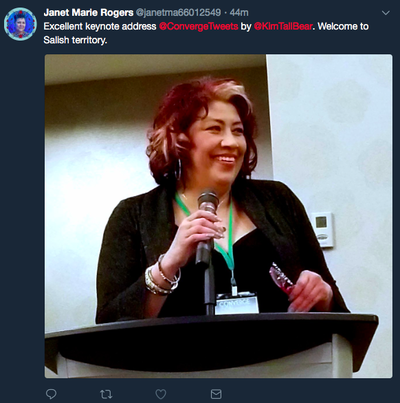 Keynote lecture given at the Second Annual International Solo Polyamory Conference (SoloPolyCon18), Seattle, WA, USA, April 14, 2018 During the weekend of April 7-8, 2018, I attended Converge Con in Vancouver. It is a conference “that originated with a desire to build sex positive communities, and start a dialogue around sexuality, relationships and activism.”[1] I had the honor of being on the closing panel, #MeToo in the Age of Consent, with Erin Tillman, the author of The Consent Guidebook, and sex educator, Jimanekia Eborn—both from L.A. The final question posed to our panel was: If there was one thing you wanted people to take away this weekend about autonomy, agency, power, and creating a culture of consent, what would that be? “Remember your structural analysis,” I responded. Settler sexuality—that gives us this hetero- and increasingly homonormative compulsory monogamy society and relationship escalator intimately tied to settler-colonial ownership of property and Indigenous dispossession--is a structure. Converge Con was refreshing with so many people with similar filters about sex-talk, meaning…let’s talk unabashedly about sex. All of it! They set up a separate social space for between session gabbing because in 2017 there were complaints from “normies” at the hotel about all the sex talk happening in the lobby. At Converge Con sessions included “Group Sex Demystified,” body positivity, liberation from repressed sexual shame, sex positive parenting (loved that one), “Masturbation for Healing and Creation,” “How Society’s Representation of Beauty…Impacts Sexual Self Expression,” and how to manage sex and relationships when coping with depression. There were many sessions that teach us as individuals, couples, families or even communities techniques for liberating ourselves psychologically, emotionally, even spiritually from sex negative and shaming thoughts and behaviors. I found less emphasis on averting our gazes from our own bodies, individual, family, or community histories to look hard at the (settler) state and its structures. Those structures not only indoctrinate us with settler ideals, but they have legally and economically enforced certain forms of sex and relationships throughout the existence of these nation states. It is necessary to throw off shame, love one’s self and one’s body, rejuvenate, and practice self-care. Yet a focus on even sex positive bodies and relationships vs. a focus on sex negative bodies and relationships, is not in and of itself a structural analysis. Focusing on sex and body positivity helps us cultivate the energy to fight systemically. And personal transformation cannot fully occur without societal transformation. The two are co-constitutive—meaning individual and societal change help produce one another. I want us to always keep that in mind. The heteropatriarchal state would prefer we focus our eagle eye on our own shortcomings exclusively, and not its extractive and oppressive structures. A Note on Terminology: Settler and Settler Sexuality My colleague at Queens University, queer theorist Scott Morgensen, has popularized in academic circles—and this bleeds into Indigenous sexual health circles—the term “settler sexuality.” He defines this succinctly as: The heteropatriarchal and sexual modernity exemplary of white settler civilization.[2] If that is too succinct, he has also explained settler sexuality as: A white national heteronormativity [and increasingly also homonormativity] that regulates Indigenous sexuality and gender by supplanting them with the sexual modernity of settler subjects.[3] His work and the work of other anthropologists and historians of Euro-American settlement, marriage and monogamy in the US and Canada, shows how it was not only Indigenous people that were forced into monogamy and state sanctioned marriage.[4] Those relationship forms were intimately tied up with the appropriation of Indigenous collectively held land and its division into individual allotments to be held privately. Men as heads of households qualified for a certain acreage. They obtained more if they had a wife and children. Women of course were tied to men economically. Accordingly, compulsory monogamy and marriage have been forced on other non-monogamous and sometimes non-Christian communities as well. Thus, settler sexuality can be translated more straightforwardly as both heteronormative and homonormative forms of “love,” “sex,” and marriage that are produced along with private property holding in the US and Canada. Therefore, when I use the term “settler,” I am not interested in nitpicking who is and is not a “settler” on an individual level. Americans often find the term odd, too polite, actually. On the other hand, more Canadians are a bit more accustomed to “settler,” and don’t often find it so polite. Some of them seem to have the same reaction to the term “settler” as they do to being called “white.” But I also know many academics, both white and “visible minorities” (the term used frequently in Canada for “minorities” or “people of color,” and which includes recent immigrants) who identify as “settlers.” And when they do, it is with explicit recognition that their lives in Canada are made possible by settler-colonialism. There are vibrant conversations in Canada and in the US (although more so among academics in the US) that debate the applicability of the term “settler” and suggest new terms for non-racially privileged, non-Indigenous groups, e.g. African-Americans or recent non-white or non-Christian immigrants who enter the US or Canada due to conditions of war and violence in many cases due to settler state imperialism abroad. There will be no untroubled definitions of the category of settler. Instead, I focus on settler-colonial state power, including its cultural power, which all of its citizens are capable of shoring up. I see non-Indigenous racially disadvantaged citizens as potentially complicit in settler-colonial appropriations of Indigenous (re)sources. And many of us across racial and religious lines have been made complicit in helping uphold settler forms of sex. Kyle Powys Whyte, a Potawatomi environmental philosopher and activist who teaches at Michigan State explains very pithily how the citizenry broadly is involved in ongoing settler-colonialism. In a recent article in Yes! Magazine, he writes: Whether one participates in settler colonialism is not entirely a matter of when or how one’s ancestors came to the U.S. Having settler privilege means that some combination of one’s economic security, U.S. citizenship, sense of relationship to the land, mental and physical health, cultural integrity, family values, career aspirations, and spiritual lives are not possible—literally!--without the territorial dispossession of Indigenous peoples.[5] Are Non-normative Sexualities also “Settler Sexuality”? So-called non-normative sexualities and relationship practices, such as polyamory—I would say especially solo polyamory within that--do challenge important settler state cultural restrictions, but they also tend to assume the inevitability of settler-colonial cultural norms and governance structures. They do not sufficiently interrogate Indigenous dispossession for the rise of a private property state. They often simply want to redeem the settler state into a more multicultural and inclusive entity, without asking how even alternative practices of intimate relation uphold settler colonialism. Margot Weiss, an anthropologist who wrote a book Techniques of Pleasure that examines kink communities in San Francisco and Silicon Valley shows how they consume expensive sex toys and “play” experiences on their way to personal self-actualization. She highlights gender and race dynamics and power relations in kink communities that are sometimes not so different from mainstream settler sexuality. These patterns of individual identity-making via capitalist consumption, and fairly normative race and gender dynamics rose in concert with settler-colonial nation-building. She also delves a bit into the very interesting history of old guard leather communities in San Francisco that have had more oppositional politics historically, but her focus is on newer more economically privileged kink communities, including tech sector workers. Scott Morgensen in his anthropological work in a community of radical faeries and their predominantly white back-to-the-land communities also shows how even queer sex, including non-monogamy and kink are also often enacted as forms of settler sexuality. Morgensen’s work shows how radical faeries in a rural Oregon community remain conditioned by race hierarchy, and their back-to-the-land ideology is of course predicted on Indigenous dispossession historically and erasure of Indigenous presence today. Morgensen discusses how queer claims too are conditioned by settler colonialism. He also pays close attention to Indigenous two-spirit activism and theorizing and their focus on People or tribal-specific knowledges about sexualities, relations, and relationships. The term “two-Spirit" gestures toward precolonial gender systems not based on the European sex/gender binary that concerned colonizers and which now concerns queer thinkers. If you don’t know the history of the term two-spirit, which is in wide use today, it came into common use in 1990 in Winnipeg at the International Gathering of American Indian and First Nations Gays and Lesbians.[6] As opposed to “coming out,” an important aspect of two-spirit thought is the idea of “coming in” to community to take up special roles designated for gender diverse individuals within the extended kinship webs of Indigenous communities historically. Or at least that is the ideal. Two-spirit people have struggled in Indigenous communities too with homophobia produced of colonial violence. In my Critical Polyamorist blog, I’ve written about the disproportionate influence that heteronormative couple privilege and associated hierarchies have in polynormative communities. My frustration with that mode of polyamory is explained in my critiques of how it remains very much a form of settler sexuality. More rule-bound and couple-centric forms of polyamory privilege the married, cohabiting, child-sharing couple as “primary,” with additional relationships being “secondary.” This replicates key conditions of monogamy that I find politically and ethically difficult. In short, it is not only vanilla monogamists who uphold settler-colonialism with their intimate practices linked to property, consumption, couple and marriage privilege. Within open nonmonogamy, I push for analyses that help us envision ways of relating beyond such normative arrangements and also beyond Western notions of romantic “love” conditioned—whether we know it or not—by capitalism’s coercive power. I don’t want Hallmark and Nestlé telling me when and how I need to show my love while also giving those companies my money to evangelize normative relations and unsustainably extract resources. SoloPolyamory and Being in “Good Relation” I am here with all of you at SoloPolyCon because I see more potential in solo polyamory for challenging the assumptions of settler states. I’ve considered too the potential for my focus on being in good relation—my particular Indigenous standpoint—to be in conflict with the ethic of autonomy and non-hierarchy that is a mark of solo polyamory. But then I remembered a photo that one of you posted on Facebook during last year’s conference. (I was sick and had to Skype in my talk from Edmonton.) The photo was of about a half dozen SoloPolyCon attendees hanging out at the beach. They were each standing apart, scattered along the beach like differently contoured and colored stones. And I remember the photo was captioned “Alone together.” The image looked so appealing, just the kind of community that would understand me and that might be able to be articulated with the idea of being in good relation that is being taken up with renewed commitment by different Indigenous peoples across North America these days—by academics, artists, activists, and Indigenous Twitterati. I cannot emphasize how much Indigenous thinkers are focusing on “Indigenous relationality,” an umbrella term used to help us think beyond race, the nation state, biology, and other settler conceptual impositions. Taking the “solo polyamory” explanation from our Facebook page: People who practice solo polyamory have lots of kinds of honest, mutually consensual nonexclusive relationships (from casual and brief to long-lasting and deeply committed). But generally, what makes us solo is the way we value and prioritize our autonomy. We do not have (and many of us don't want or aren't actively seeking) a conventional primary/nesting-style relationship: sharing a household & finances, identifying strongly as a couple/triad, etc.[7] How do I see that as being articulated with the idea of Indigenous relationality? Autonomy from compulsory monogamy or even the nonmonogamous hierarchical couple need not be defined as “single.” Solo polyamory for me is a de-escalation from the couple. For me and others it is a refusal to get on the escalator (again). But it can simultaneously also lend itself to living in extended relation and disrupting commonly accepted relationship categories. Many of us work to build networks of made kin as essential support systems, and with more fluid boundaries. And many of us do this under settler structural duress. It’s just that most solopoly people probably don’t name the challenges they face as settler-colonialism. I’ve written and talked elsewhere about my Dakota ancestors’ practices of relating and their “sexualities” as we call it today. Before settler-imposed monogamy, marriage helped to forge important Dakota kinship alliances, but divorce for both men and women was possible. Women also owned household property. They were not tied to men economically in the harsh way of settler marriage. More than two genders were recognized, and there was an element of flexibility in gender identification. People we might call “genderqueer” today also entered into “traditional” Dakota marriages with partners who might be what we today consider “cisgendered.” In a world before settler colonialism—outside of the particular biosocial assemblages that now structure settler notions of “gender,” “sex,” and “sexuality,” persons and the intimacies between them were no doubt worked quite differently. In thinking about “sex,” how did my ancestors share touch as a form of care, relating, and connection before the imposition of settler structures of sexuality and family? There is much that has been lost due to forced conversions to Christianity and the sexual shaming that came with that. And so much of settler sexuality has been imposed onto Indigenous peoples in place of our ancestors’ practices, both heteronormative and now also “queer” settler sexuality. But in a world before settler colonialism and its notions of “gender,” “sex,” and “sexuality,” persons and the intimacies between them were no doubt worked quite differently. And yet, we Dakota continue to live in a way that embodies in our 21st-century loves, long-held kinship structures. Many of us continue to live in extended family where the legally married couple is not central, where children are raised in community, and where households often spill over beyond nuclear family and across generations. Can we not then also imagine sexual intimacies outside of settler family structures? I know we already have them. Can we name and measure them without using settler sex and family forms as reference points? It is also important in unsettling settler sex and family to mine historical and language archives in order to know more about what kinds of relations were possible before settler-colonial impositions, including nonmonogamous relationships that were common in Dakota and other Indigenous cultures. This suggestion will be met with resistance by some Indigenous people. Our sexual shaming and victimization has been extreme at the hands of missionaries, in residential schools, and by government agents who all wielded violent control over Indigenous lives. There are still many of us have not recovered from the shaming of Christian sexual mores, and supposedly secular state institutions that continue to monitor, measure, and pathologize our bodies and our peoples. That said, I am beginning to hear from younger Indigenous people either via comments on my blog or when I give lectures at universities, that they would like to embrace open and honest nonmonogamy. But in addition to a shortage of willing Indigenous partners, they worry about the judgement of their elders who are still immersed in values that younger people see as a holdover of residential schools and the church. One Indigenous undergraduate asked me what my elders think of my nonmonogamy. I remember exactly how I responded: I don’t know what they think. They don’t say anything to me, and I’m pretty open on Facebook, and on my Critical Polyamorist blog. But I’m almost 50, and at 55 I'll get a senior discount at businesses on my reservation. I’m almost an elder myself! I also earn my own money and I’m an academic. With that comes more freedom than most people have. So I’m not really worried about what people think. But I know you do have to worry. I try to make space for others so someday they will have the choices that I have. Writing and speaking this talk is to make just a little more space. Yet in our lives as Indigenous people, we already unsettle settler relations in courageous ways. Think about work that Indigenous people do to defend the earth in order to have a chance at (re)constituting good relations with our other-than-human relatives. I think of the resistance to resource extraction that particularly Indigenous women and two-spirit people have organized via IdleNoMore and Standing Rock, sometimes at great personal risk. These are both movements that link the defense of Indigenous treaty rights to defense of the planet, which is a way of also caring for our human descendants to come. In terms of that idea of being in good relation, I consistently compare “environmental” caretaking to caretaking human relations. Accordingly, decolonizing sex is one way of re-constituting good relations with some of our human relatives. Of course I use “relative” broadly since “we are all related.” I will be paying close attention the rest of the weekend at this conference to notice potential articulations between solo polyamory and forms of Indigenous thought and practice related to sex and relationships. Disaggregating “Sex,” Reaggregating Relations: The Example of Moreakamem I want to dig just a bit deeper into the theory behind being in good relation by providing one more example of nonmonogamy and by settler standards non-normative sexuality among an Indigenous people in what is today Sonora, Mexico. There is a type of Indigenous healer there who can teach us a lot about being in good relation in ways that refuse settler sexuality. My friend, David Shorter, an Indigenous Studies scholar at UCLA, wrote an essay entitled simply, “Sexuality.”[8] That essay resulted from the time that Shorter spent with moreakamem—healers or seers among the Yoeme. Being also a religious studies scholar, he had originally set out to understand the “spiritual” aspects of moreakamem as healers. But his analysis came to entangle “sexuality” with “spirituality.” In southern Yoeme in Sonora, an elder told Shorter that individuals who engage in nonmonogamous and/or non-heterosexual relationships are often also moreakamem. In fact, in northern Yoeme communities in Arizona, moreakame has come to be conflated with terms such as “gay,” “lesbian,” or “two-spirit,” and other less positive terms. Indeed, the healer aspect of the word has been lost for US-based Yoeme who have much ethnic overlap with “Catholic Mexican American” communities. But among southern Yoeme, Shorter found that he could not understand the powerful “spiritual” roles in community of moreakamem without also understanding their so-called sexuality. He explains that in many Indigenous contexts, there is an “interconnectedness in all aspects of life.” Following the connections between sex and spirit among the Yoeme was akin to “following a strand of a spider’s web.” Shorter sees both sexuality and spirituality as sets of relations through which power is acquired and exchanged between persons or entities. So when he writes about moreakamem, he emphasizes their focus on relating and their relational sharing of power with those who seek healing, with deities and spirits, etc. The moreakamem have reciprocity with and receive power in their encounters with spirits, ancestors, dreams, animals. And also in the human realm when they use their power to see for and heal other humans suffering from love or money problems, addictions, and other afflictions of mind and body. But moreakamem refuse to accentuate their personal characteristics and capacities. They do not focus on their own so-called sexuality or even their power to heal. Rather, they focus on their work in community. Shorter explains that these healers “work tirelessly and selflessly to maintain right relations.”[9] And he too refuses to classify Moreakamem as gay or nonmonogamous. Shorter also encourages his readers to de-objectify (I might say decolonize). That is, we should try not to think of sexuality, spirituality (and nature too) as things at all. This is difficult: In a settler framework—whether in bed or in ceremony—relations get appropriated if you will and made into “things.” They get named or objectified as “sex” or “spirituality.” David Shorter asks us to see that what settler culture turns into objects are actually sets of relations in which power (and sustenance?) circulates. I am thinking that I would add that our relations then become resources for the settler state to measure, monitor, and exploit to in complex ways build settler knowledge and national identity. This is why I can say we might decolonize relations as we de-objectify them. An important practical outcome of this shift in thinking is that if we resist hardening relations between persons (be they human, nonhuman, or spirit) into objects, we might be better attuned to relating justly in practice, and we might reclaim our relational “resources.”[10] We might attend to being in good relation and what that requires and resist having our relating both stifled and remade by less flexible “natures” and hierarchies. Therefore, It is not only for moreakamem, but for all of us that “sexuality” can be understood as a form of reciprocity and power exchange”—a way of being that “mediates social relations across the family, clan, pueblo, tribe,” etc. We exist not simply in nature but we exist in relation to one another. With this understanding of sexuality, it begins to look as Shorter writes, “more like a type of power, particularly one capable of healing” and transforming.”[11] Think of that co-constitution and re-constitution of our sexualities if we are polyamorous—the multiple, diverse sets of relations, power exchange, and subjectivities that result from multiple relating. I leave you with a powerful quote by David Shorter: Sexuality is not “like” power…sexuality is a form of power: and, of the forms of power, sexuality in particular might prove uniquely efficacious in both individual and collective healing. Further, I will suggest that sexuality’s power might be forceful enough to soothe the pains of colonization and the scars of internal colonization. David Delgado Shorter (2015): 487. Radical Hope Dominican-American writer Junot Díaz expresses two powerful ideas that have been helpful to me of late. In a September 14, 2017 interview with Krista Tippett of the On Being podcast, Díaz explained that in this moment of crisis—and always—it is imperative that critical thinkers be “misaligned with the emotional baseline” of mainstream society. He also explained his notion of “radical hope,” his trust that “from the bottom [meaning those not in power] will the genius come that makes our ability to live with each other possible.”[12] I see that emotional baseline as dreaming of a progressive settler state. Tippet, the interviewer, then recounted Díaz ’s idea that “all the fighting in the world will not help us if we do not also have hope, which is not blind optimism, but radical hope. Talk about what that is…” she said. Díaz responded: I do trust in the collective genius of all the people who have survived these wicked systems. I trust in that. I think from the bottom will the genius come that makes our ability to live with each other possible. I believe that with all my heart. I have radical hope that settler relations based on violent hierarchies and concepts of property do not have to be all there is. This crisis or transition time in the US and Canada, and globally, offers an opportunity to cease cultivating a misplaced love for the state that insists on dreams of progress toward a never-arriving future of tolerance and good that paradoxically requires ongoing anti-blackness and genocidal violence. The path toward the supposed democratic promised land of settler mythology is in everyday life a nightmare for many around the globe. We require another narrative path to guide us. Indigenous people are proposing a relational web framework that is more about here and now, and not about when. We have an opportunity, if we choose to see it that way, to be misaligned with the emotional, intellectual, and (un)ethical baseline and narrative of those who hold power. We can have radical hope in a narrative that entails not redeeming the state, but caring for one another as relations. How do we live well here together? The state has and will continue to fail to help us do that. 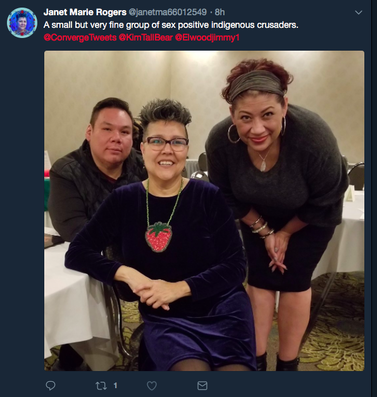 I leave you with an inspirational quote from an Indigenous thinker who is misaligned with the emotional baseline of settler sexuality. At Converge Con last week, I interviewed Janet Rogers for the Media Indigena podcast I do every other week. Janet is a poet and performance artist who is Mohawk and wrote the book Red Erotic in 2010. There is a more Indigenous erotica coming out now, but Janet was a bit ahead of the curve perhaps. I mentioned to her that at Converge Con I felt like non-Indigenous people were more respectful and less invasive with their questions and their assumptions about my Indigenous perspective than is usually the case when I am in a largely non-Indigenous space. I thought their focus on consent culture might have a lot to do with their respectful behavior. Here is what she had to say: I’m … coming to the realization that the sensitivity, the consideration, the education, the awareness, the “awokeness”—if you will—within the sex positive community overflows into that awareness, sensitivity…into how those communities are relating to Indigenous people….Your practice and understanding of your own sexuality overflows into the rest of your life. That’s where it begins!...If you’ve got that resolved in the bedroom…all of that empowerment, all of that positivity is going to overflow in other areas of your life. I am taking her advice to heart. I am trying to get it right in the bedroom so I can get it right in the rest of my life. I think you are too. ---------------- NOTES *ACKNOWLEDGEMENT. Thanks to all of the people at Converge Con 2018 in Vancouver who I had the pleasure of thinking with over the weekend of April 7-8, 2018. Their sex positivity work in the world fertilized this keynote that I gave the following weekend, April 14, 2018, in Seattle. [1] http://www.convergecon.ca/about/. [2] Scott L. Morgensen . The Spaces Between Us: Queer Settler Colonialism an˙d Indigenous Decolonization. Minneapolis: University of Minnesota Press, 2011: 23. [3] Scott Lauria Morgensen. “Settler Homonationalism: Theorizing Settler Colonialism within Queer Modernities,” GLQ: A Jouranl of Lesbian and Gay Studies 16(1-2) (2010), 106 [4] Katherine Franke. Wedlocked: The Perils of Marriage Inequality (New York: NYU Press, 2015). Also see Nancy Cott, Public Vows: A History of Marriage and Nation (Cambridge: Harvard University Press, 2000) and Sarah Carter, The Importance of Being Monogamous: Marriage and Nation Building in Western Canada to 1915 (Edmonton: University of Alberta Press 2008). [5] http://www.yesmagazine.org/issues/decolonize/white-allies-lets-be-honest-about-decolonization-20180403. [6] Morgensen 2011, 81. [7] For more on solo polyamory, check out these two-oft read articles. Aggiesez. “What is Solo Polyamory? My Take.” SOLOPOLY: Life, Relationships, and Dating as a Free Agent. December 5, 2014. Available at: https://solopoly.net/2014/12/05/what-is-solo-polyamory-my-take/. And Elisabeth A. Sheff. “Solo Polyamory, Singleish, Single & Poly.” Pyschology Today. October 14, 2013. Available at: https://www.psychologytoday.com/blog/the-polyamorists-next-door/201310/solo-polyamory-singleish-single-poly [8] David Delgado Shorter (2015). Sexuality. In The World of Indigenous North America. Robert Warrior (ed.). New York and London: Routledge: 487-505. [9] Shorter 2015, 490 and 497. [10] I have actually expanded the thinking on decolonization in this paragraph beyond what I spoke during the keynote. In editing this for the blog, I realized that I needed to explain my use of “decolonization” in this paragraph. I am still thinking through this use of decolonization so I welcome thoughtful thoughts from others who work with decolonial ideas in Indigenous Studies especially. [11] Shorter 2015, 497-8. [12] On Being with Krista Tippett. Interview with Junot Diaz. https://onbeing.org/programs/junot-diaz-radical-hope-is-our-best-weapon-sep2017/. September 14, 2017. (Retrieved February 11, 2018). Dear friends, I'll read a series of my Critical Polyamorist 100s at the Poets' Theatre at the Armory in Somerville, Massachusetts, September 1. See the flyer below for more information. Around the 100s, I will also give commentary, sort of a mini and not too-academic lecture, about critical relations that disrupt settler state ideas of relating, including compulsory monogamy. The compulsory monogamy system in addition to the privileging of state-sanctioned marriage and imposed norms of nuclear family and private property have disrupted Indigenous notions of extended family and more just and sustainable relations with more-than-humans. My longtime friend and writer-colleague, Richard Cambridge, curates this reading series. In a former life as a performance-oriented poet (long before I was an academic), Boston and Cambridge were my poetic stomping ground. I left reluctantly in early 1996 for professional opportunities. While I have finally found another home in Edmonton, Alberta, this reading is a sort of homecoming for me. The last time I did a reading of creative writing in the Boston area was in 1995. I have focused on academic writing for nearly two decades now. The Critical Polyamorist 100s have helped bring creative writing back into my writing practice. The 100s are informed by and in turn loop back to inform my academic work within non-monogamy studies, Indigenous studies, and science studies in which I challenge imposed and colonial forms of settler relations.
I'll also be in town for the Society for Social Studies of Science (4S) annual meeting in Boston, August 29-September 2, 2017 where I'll be giving comments as part of a Presidential Plenary panel, "Interrogating the Threat," that will focus on what we as Science and Technology Studies (STS) scholars should be most concerned about in this current moment. The panel will consider questions "across domains of settler colonialism and the (post)colonial, (in)security and (anti)militarism, bio and health politics, race/difference and (im)migration, and multi-species environments." That's a mouthful. I hope to see you, if you're in town, at one or maybe even both events. 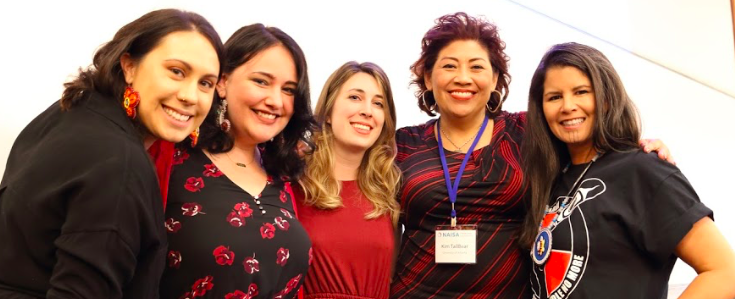 Tipi Confessions NAISA panel: L to R: Kirsten Lindquist, Brittany Johnson, Charlotte Hoelke, Kim TallBear, Tracy Bear (photo: Jun Kamata) Tipi Confessions NAISA panel: L to R: Kirsten Lindquist, Brittany Johnson, Charlotte Hoelke, Kim TallBear, Tracy Bear (photo: Jun Kamata) Critical Poly Note: My academic work and the personal-political work of living a critical polyamorist life are increasingly coming together. They especially intersect in the sexy storytelling show Tipi Confessions that I produce with colleagues from the University of Alberta, Faculty of Native Studies. With a contract and mentorship from the original Bedpost Confessions sexy storytelling show in Austin, Texas and their founding producers, we do Tipi Confessions shows in Edmonton and across Canada. This blog post is a talk that I gave at the Native American and Indigenous Studies Association (NAISA) 2017 Annual Meeting, University of British Columbia, June 24, 2017. In this talk I highlight the creative, academic, and decolonization work that intersect in Tipi Confessions and the research-creation lab we are building around the show. This talk was given under my other moniker, Kim TallBear, Associate Professor and Canada Research Chair in Indigenous Peoples, Technoscience and Environment at the University of Alberta Faculty of Native Studies. In this talk I describe an innovative new community-based research program and creative methodology at the University of Alberta Faculty of Native Studies. Tipi Confessions is comprised of sexually-themed performances that take creative research methodologies to the stage. Please join us at the Chan Centre of Performing Arts here on the UBC campus tonight at 7:30 for our show, which has also appeared with a variety of different performers in Edmonton, Saskatoon, and Ottawa. Three Indigenous women from the University of Alberta—Professors Tracy Bear and Kim TallBear, and social media maven Kirsten Lindquist, with occasional guest producers—produce 3-4 Tipi Confessions shows annually. In addition, Charlotte Hoelke, Indigenous graduate student at Carleton University produces a student-run Tipi Confessions show in Ottawa. Our shows are sometimes associated with academic symposia as is our show this week at NAISA. Tipi Confessions was first held in December 2015 with all Indigenous performers at the University of Alberta Indigenous Masculinities symposium, where we drew a capacity audience of 200 at the Art Gallery of Alberta theatre. We produced our second Edmonton-based show in October 2016 at a Fringe complex theatre to accompany the Prairie Sexualities symposium co-organized by University of Alberta Women & Gender Studies professor Susanne Luhmann in collaboration with feminist scholars from the University of Saskatchewan. We produced our third show this past February 18, 2017 at the University of Saskatchewan in collaboration with OUTSaskatoon. They approached us after seeing our Prairie Confessions show and asked if we could bring the show to Saskatoon as part of the weeklong queer arts and performance festival, Wîsahkêcâhk Comes to Town! With advising from University of Alberta drama faculty—our dramaturge, Professor Donia Mounsef—and with mentoring from the producers of the original Bedpost Confessions™ show in Austin, Texas, Tipi Confessions, Indigenizes the highly successful sexy storytelling and performance format developed in 2010 by three writer/producers--Julie Gillis, Sadie Smythe, and Mia Martina in Austin. In the seven years since, Bedpost Confessions has been a proven performance technology. The quarterly show is heavily attended in Austin—I’ve seen long entrance lines around the venue—and is known in the city for promoting sex positivity via performance, associated workshops, and outreach to diverse constituencies. It is a truly brilliant format and we are grateful that the founders in Austin contracted with us add an Indigenous flavor and to bring the show to Edmonton and other cities across Canada. Our shows solicit from the university and local communities stories and performances focused on sex-positive themes. Stories can be explicitly political, feminist, humorous, and/or educational. Performances fit the Bedpost Confessions™ mission of ethics, education, and entertainment around sex, sexuality, and gender. The show also considers performers who do comedy, video, burlesque, short stage readings, or any performance that features positive sexuality. However, anonymous audience confessions—read on stage by our MCs—are “always the stars of the show,” a Bedpost Confessions tagline. Confessions run the gamut from simply salacious to also hilarious and sometimes moving as our audiences—like many of us—have overcome or are overcoming so much, including sexual trauma. They confess their difficult journeys sometimes towards positive sexuality after the shame and trauma rendered especially via colonial suppression of Indigenous sexualities. We will soon call for submissions for a Halloween 2017 show to be held again at the Fringe Theatre complex in Edmonton. Our aim is to produce Tipi Confessions as a triannual (fall, winter, spring,) show in Edmonton in addition to producing shows to accompany academic symposia when an irresistible opportunity arises. We have found that it is considerably more work and sometimes more expensive to take this show on the road largely because of having to deal with new and less familiar social and organizational networks, and new theatre venues and processes that risk unexpected costs. But we learn as we go. A point to emphasize: While we are Indigenous-women led and thus we center Indigenous analytical and ethical frameworks, especially prairie-Indigenous histories, cultures, languages, and sensuous topographies, we are inclusive of other Indigenous and non-Indigenous performers in most of our shows. The producers decided early on that we would invite many diverse people into our tipi while still centering our standpoints. We solicit works from Indigenous and non-Indigenous artists and writers. We invite a diverse array of performers into our metaphorical tipi. And as two-spirit Cree elder Marjorie Beaucage from Saskatoon said at the show there, “tipis have no closets."
The Research-Creation Approach Tipi Confessions serves as the anchor of a “research-creation laboratory,” a space of creative experimentation and action research co-produced with our existing decolonial and critical sexualities research and curriculum in the Faculty of Native Studies at the University of Alberta. You’ll hear more about these activities from Tracy Bear and others later on this panel. Tracy teaches the very popular Indigenous Erotica course at the University of Alberta. And I teach a course, (De)Colonial Sexualities that works to disaggregate both the concepts of “nature” and “sex” back into “relations” thus decolonizing or even displacing those terms. I seek to demonstrate in my work that so-called sex and nature are not fundamental ways to organize world or the variety of bodies that inhabit it. And I think “sex” and “nature” are unfortunate translations for many Indigenous peoples of the ways in which we relate to both our human intimates and our other-than-human loves, including the land- and waterscapes of our hearts. Tipi Confessions offers University of Alberta faculty, students, and staff as well as students and researchers at other universities (e.g. at Carleton University under the direction of Charlotte Hoelke with mentoring also from Bedpost Confessions) an experimental space in which to combine performance with research in the humanities and social sciences. How do we do that, and what is the research-creation approach, specifically? Chapman and Sawchuk in their 2012 article on research-creation explain: Research-creation…projects typically integrate a creative process, experimental aesthetic components, or an artistic work as an integral part of the study. Topics are selected ad investigated that could not be addressed without engaging in some form of creative practice, such as the production of a video, performance, film, sound work, blog or multimedia text. While works may be exhibited or performed as “art” and research-creation is occurring in a wide-range of cultural institutions and disciplines, the focus of this article is how this practice act as an epistemological intervention into the “regime of truth” of the university. Universities and other degree-granting institutions have firmly established protocols and practices for what constitutes valid scholarship that act as normative frameworks for modes of presentation. Research-creation can thus be read as a methodological and epistemological challenge to the argumentative form(s) that have typified much academic scholarship. In research-creation approaches the theoretical, technical, and creative aspects of a research project are pursued in tandem, and quite often, scholarly form and decorum are broached and breeched in the name of experimentation. I have also broached and breeched scholarly decorum in my social science-meets-Indigenous-planner work and the way that I have approached my anthropology of science work. As a feminist researcher, I found that I had to care for my subject. My book Native American DNA: Tribal Belonging and the False Promise of Genetic Science turned the gaze back onto largely white, heterosexual, males—those who usually find it their prerogative to gaze at us. However, not caring for my subjects—indeed wanting their research projects and worldview to fail—was a demoralizing form of research while also constituting an important challenge to their colonial research regime. But the former planner in me conceived of another way to also work that addressed that predicament. I began to work with critical non-Indigenous scientists and the very few Indigenous scientists I could find to train and mentor young Indigenous scientists who were still students. I work with scientists who founded the Summer Internship for Indigenous Peoples in Genomics (SING), an annual summer training and networking program with both wet lab and dry lab (or decolonial bioethics) components. I wanted to help change science from within. I could not have done this work as a legitimate complement to my anthropology that gazes at a subject population’s curious cultural practices if I held fast to the misguided ship of standard notions of objectivity that purport to gaze and study from a so-called distance. Rather, I practice feminist objectivity and Indigenous standpoint that is highly self-reflexive about the historic, geographic, and bodily grounds from which I am rooted when I ask my particular research questions. I do not delude myself like so many weak objectivity thinkers that I gaze from nowhere. But to return to Tipi Confessions and research-creation, this methodology and concept provides our research group and production team a particularly moving and productive path to generate performances—creative works that are pleasurable, healing, and transformative—while also attending to histories and ongoing social dynamics of colonization and decolonization. Research-creation and the project of Tipi Confessions and the broader Decolonial Sex and Sustainability Lab (DSSL) are ground in appeals to my planner’s sensibility. We research and perform for social change. And in Tipi Confessions, the transformation sparks within the 2-hour timespan of the show. In summary, the research-creation approach helps us to transcend university walls as we engage artists, performers, activists, and community members in Edmonton and across Canada in the active work of decolonizing sexualities and sex practices—Indigenous and not. That is the broader context. Let me now provide a few more details about what our lab is organizing in terms of academic programming. The Decolonial Sex and Sustainability Laboratory: Reconstituting Relations The mission of the Decolonial Sex and Sustainability Laboratory (DSSL) will be to articulate theories, social science, and creative action-research outputs that help envision new and re-envision old models of sustainable relations between humans and with our other-than-human relations, be those nonhuman animals, waters, and land upon which we depend as human communities. Unsustainability is not only an artifact of humans using too many resources of “nature,” e.g. harvesting too many trees, fish, and other animal bodies, pulling fossil fuels out of the ground in ever-dangerous and contaminating ways, and using fossil resources to fuel unsustainable agricultural systems and growth economies. We can also understand social relations between humans as unsustainable, as both materially and socially resource intensive with the costs and benefits unevenly distributed. The same hierarchies of life or hierarchies of organisms that enable human domination of nonhuman animals and the environment have enabled racial domination of European (Americans) over Indigenous people and other “visible minorities” or “people of color.” Those hierarchies of life also enable male domination and de-animation (making less alive or vital) of women and other genders. They enable the domination of disabled bodies, queer bodies, and other non-normative humans. Social and cultural development that also always involves economic and institutional development has come disproportionately at the expense of the marginalized and disproportionately shores up the wealth—both material and social—of the privileged. Unsustainable sexual relations are also key to the resource-intensive, private property settler-colonial regime that our laboratory will work to intervene in. The DSSL will undertake several intersecting initiatives that I will list only briefly. I don’t want this talk to end like a grant proposal:
Below is a photo of the three Tipi Confessions producers after our interview (along with Bedpost Confessions' producer Julie Gillis) with the academic broadcaster, Minelle Mahtani, on her Sense of Place weekday show on Vancouver's Roundhouse Radio 98.3 . You can listen to the hour-long interview here. Acknowledgements: Thanks to our show photographer, Jun Kamata, photographer, writer, and Professor at Asia University, Tokyo. Thanks also to our sponsors for the Vancouver Tipi Confessions show at the Chan Centre for Performing Arts: Womyn's Ware for sexy prizes for audience members and to YouthCO and QMUNITY for condoms and lube distributed free to audience members. Pleasurable, consensual, and safe sex! |
Photo credit: Short Skirts and Cowgirl Boots by David Hensley
The Critical Polyamorist, AKA Kim TallBear, blogs & tweets about indigenous, racial, and cultural politics related to open non-monogamy. She is a prairie loving, big sky woman. She lives south of the Arctic Circle, in Edmonton, Alberta, Canada. You can follow her on Twitter @CriticalPoly & @KimTallBear
Archives
August 2021
Categories
All
|
